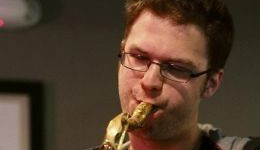Evan B


Instruments: Piano, Guitar, Saxophone, Clarinet, Drums
Styles: Classical, Jazz, Pop, Rock, Folk


Evan B

Instruments: Piano, Guitar, Saxophone, Clarinet, Drums
Styles:
Classical, Jazz, Pop, Rock, Folk
Where I Teach:
Ages Taught: 10-80
MM, William Paterson University, Jazz Performance Teacher's Certificate, Umass Lowell, Music Education BM, McGill University, Jazz Performance
I am committed to a lifetime of growth in both the performance and education of music, and have been for qute some time. It all started, I suppose, in high school when I was fortunate enough to be a participant in a very high quality program. I am primarily a jazz saxophonist, but my interests do not end there. Alongside my unremitting passion for the jazz saxophone, I began teaching myself guitar and piano (in high school) and drums and voice not long after. I am well versed in the pop/rock genres and have taught myself through learning popular songs but even more singificantly through composition; I have written over one hundred songs as a singer-songwriter and have much to impart in this field. The skills developed in these areas (improvisation, composition, music theory) are the ones most likely to ensure an autonomically deep and everlasting connection to confident music performance and development.
As a junior in high school I was given the oppportunity to provide inexpensive lessons to elementary students in the same town/program. It was just as much of a learning experience for us, the mentors, as it was for the students. A year later, I established, organized, and taught my own improvisation course in the form of a jazz combo of my peers that was counted as an independent study. It was an absolute blast working with my peers, having the opporunity to test out each other's compositions and ideas. I have always loved teaching and so a vast amount of my teaching has been in the form of informal lessons to my friends because I beleive that anyone can learn to enjoy playing music at any level. In between my two performance degrees, I took classes at UMass Lowell in education and was blown away by how innovative and helpful the program proved to be. Lastly, I have been teaching guitar and piano lessons to children 6-15 off and on, for about five years now.
Of course, every student is different, and an integral part of my philosophy involves getting to know each student so that I may learn their creative preferences, strengths, and weaknessness. I do not shy away from books, I do indeed enjoy working out of the Hal Leonard collection because I appreciate the step by step structure. This may apply less to guitar, however, if the student's primary ambitions are to learn songs by Green Day or The Beatles, etc. Jazz music has its own rather extensive work load, which differers greatly from classical and rock, but I hope very much to put my qualification in this realm to good use very soon. Typically, I like to break the lesson up with a healthy balance of techique (scales, chords, etc), interpretation (etudes, pieces), and creativity (free play, improvisation, composition, etc.)
My main objective is to steer the pupil towards a place of autonomy so they are able to solve music related problems on their own and develop the intrinsic ability already present within themselves. It is important to be able to read music, notes and rhythms etc., due to the innumberable and undeniable advantages to being musically literate (this of course extends to, depending on the level of the student, music history and theory as well). Having said that, possibly an even more pressing skill would be to be equppied, physically and intelectually, to play along with an impromtu music session, or "jam." If, say, a former clarinet student of mine should find him or herelf in the company of a strumming acoustic guitarist, it is my hope that they will be condfident and able to contribute musically and sensibly without the need for sheet music. This is why I try to not ignore the deeper, more holistic aspects of the art, which is why I emphasize composition in my lessons. I will compose for my students pieces that highlight something they are working on, but I will also assign compositions for my students because kids love it and creativity yields a deeper connection to any given subject than, say, rote memorization. I love kids and do not stifle their creativity, without steering too far away from the task at hand, I like to listen to what they have to say because you never know what valuable information you may learn about their present perspective.


